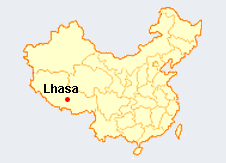Win a coupon
Your opinion is vital for us to improve our service and further to offer you an excellent China trip. Now, your golden ideas are needed and they may earn you a coupon. Join us for your chance to win a prize!
With your green fingers make an easy but visible difference to the environment along your trip way
Home > China Guide > Lhasa
Lhasa, the sacred center of Tibet, literally means "the place of gods" in Tibetan. The yak-butter-smell monasteries, the devout pilgrims and breathtaking scenery here will be soul-recharging.

Lhasa and Tibet Tourist Attractions
Potala Palace Jokhang Temple Drepung Monastery Sera Monastery Norbulingka Palace Barkhor Street Ganden Monastery




Lhasa, the capital of the Tibet autonomous Region in China from 1642, is located at an elevation of 3,650 meters (12,000 ft) on the northern slopes of the Himalayas near the Lhasa River. The inaccessibility for the complicated weather and geography and the traditional hostility of its religious leaders toward outsiders has sheltered this land from the outside moderation invasion and well kept the distinctive traditional culture. Such a pure place has annually lured millions of visitors to search for answers and seek inspiration.
As the religious centre and soul of Tibet, everything here bears heavy religious legacy weight. Potala Palace--the former palace of the Dalai Lama, Jokhang Temple-- holiest and oldest temple, Sera and Drepung Monastery--two of Lhasa's Three Great Monasteries as well as temples, Buddhist pagoda, prayer-wheeling-paths, and prayer-flag-dotted hilltops. This sacred religion is carried out by the locals in an impressively devout way: the sutra-reciting pilgrim mass prostrating on the ground, the shabbily-clothed believers donating all their money to the temples and even the Buddhist departed practicing the Buddhism kind deed teachings to an extreme extent by conducting their last kindness in celestial burial by feeding the condor with their remains.
To advance the local development and adapt to the increasing tourists, the city in the past decade has accomplished big-scale communication constructions like Qinghai-Tibet Railway, airports and highways, which unavoidably creates a bittersweet reality. Opportunities and transformation multiply here for the Tibetans. The past remote and exotic place now has become a more common and accessible destination for the tourists whiles the unique Tibetan history and culture encounters the assimilation and loss. By now, the city actually can be divided in to two main districts by Potala Palace. To the east is located the old district which retains the relatively heavy Tibetan touch in the Tibetan-style residences and inns and stores, farmers and herdsmen in colorful costumes, and the wafting Tibetan incense smell. To the west is the Chinatown which bustles with the modernity in the brand stores, bar streets, dancing hall, and fashionable-dress young people.
Lhasa is a unique land full of religions, culture and politics. An open-minded visit to it tends to make the tour more memorable. It is a place that will probably change the way you see the world and that will stay with you through the coming years.
- Air quality: ★★★★★
- Foreigner-friendly degree: ★★★☆☆
- Public security degree: ★★☆☆☆
- Hygienic degree: ★★★☆☆
- Traffic jam degree: ★★☆☆☆
- Internationalization level: ★★☆☆☆
- Consumption level: ★★☆☆☆
- Language: Mandarin, Tibetan
- Best traveling season: Apr. to Oct.
- Tourist resources: landscape, culture, historic relics
- Airport to downtown: 98 km
- Demographics: Tibetans (81.6%), Han (17%)
- Key words: cold, dry, mysterious, Buddhism, Potala Palace, pure, scenic, hotspring, temperature difference, Khatag, altitude sickness.
Local Delicacies: Buttered Tea (Suyou Cha酥油茶), Palace Tibetan Meal (Gongting Zangcan宫廷藏餐), Ox Tongue (Niushe牛舌), Curry Rice (Gali Fan咖喱饭), Yak Steak (Maoniu Niupai牦牛牛排), Chang (Qingke Jiu青稞酒), Tsamba (zanba糌粑), Air-dried Beef and Mutton (Fenggan Niuyangrou风干的牛肉和羊肉), Blood Sausage (Xuechang血肠).
Local Specialities: Tibet Knife (Zangdao藏刀), Thang-ga (Tangka唐卡), 9 Eyes Beads (Jiuyan Tianzhu九眼天珠), Turquoise (Lvsongshi绿松石), Tibetan National Costume (Zang Fushi藏族民族服饰), Butter Lamp (Suyou Deng酥油灯), Tibet Ornaments (Zangshi藏饰), Prayer Wheel(Zhuanjingtong转经筒), Musk (Shexiang麝香), Aweto (Dongchongxiacao冬虫夏草), Snow Lotus (Xuelian雪莲), Plateau Glossy Ganoderma (Gaoyuan Lingzhicao高原灵芝草), Highland Barley (Qingke青稞), Tibetan Carpets (Zangtan藏毯).
- Please respect local Tibetan nationalities' custom, and be aware of the altitude sickness.
Travel Tips:
- 拉萨市旅游投诉电话 Lhasa Tourism Complaints
- 0891-6650808 or 0891-6324691
- 西藏自治区旅游局 Tibet Tourism Administration Service
- 0891-6835472 or 0891-6834315
- 西藏旅游投诉 Tibet Tourism Complaints
- 0891-6834193
Useful lines:


